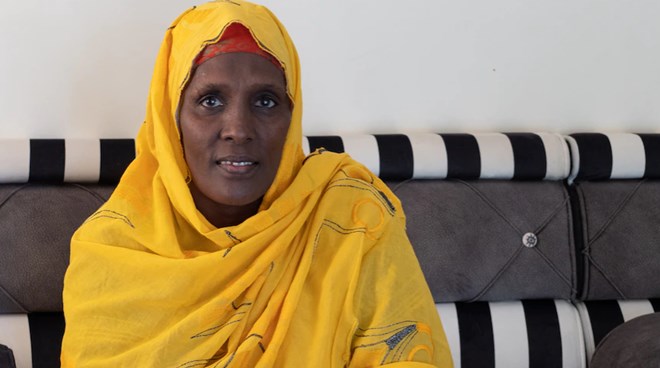
ABC Radio Brisbane /
By Edwina Seselja
Sunday August 29, 2021

Hiro says her life in Australia is worlds away from what she and her family experienced in Ethiopia. (ABC Radio Brisbane: Edwina Seselja)
When conflict broke out in the streets of Somali, a region in eastern Ethiopia, Hiro's young daughter and husband were forced to flee.
That was 16 years ago and, until recently, Hiro and her other children, who now live in Brisbane, had no idea what had become of the pair.
"I was living in Ethiopia, in Africa, and one morning my husband and my first daughter just went out to bring some water to the family," Hiro said.
"During the trip to bring water there was … fighting between the government and the troops."
After her husband fled, government officials would visit Hiro's home in the middle of the night, harassing and intimidating her and demanding to know where her husband was.
"They used to come during the night and they ask you, 'Where is your husband?' … and maybe they would take some of your animals, your goats, drink some of your water," she said.
"I said, 'I don't know where they are,' and they started torturing me'," Hiro recalled, with tears running down her face.
Eventually, she and her children fled Ethiopia on foot.
They made their way across the border to a refugee camp in Kenya where they would live for 12 years and where Hiro first put the call out to try to find her husband and daughter. Hiro's 'luckiest day'
While living at the camp, Hiro and her children were contacted by the Australian Embassy who granted them humanitarian visas.
Hiro said it was her "luckiest day".
"I got a warm welcome in Australia, they assisted me with my house, free education for my children and I got a lot of financial assistance," she said.
"Between my former life and now, there is a big difference. Thank you to the Australian Government."
The family arrived in Australia in 2019.
In July 2020, while settling into life in Brisbane, Hiro opened a case with the Red Cross to help find her husband and daughter.
In November 2020, the Red Cross called with news.
"They told me, 'We've [found] your husband'," Hiro said.
"I nearly fainted because it was unbelievable."
A relative had heard Hiro's husband's and daughter's names mentioned on an International Committee of Red Cross-BBC missing persons' program radio announcement, which airs five times a week in Kenya and Ethiopia, and alerted them that someone was looking for them.
"I didn't expect to get good news like that," Hiro said.
That day, when one of Hiro's sons returned home from work to find his mother and siblings crying, he didn't know what to think.
"[My brother] said, 'We've found Dad,' and I started crying," he said.
"I was the happiest I've ever been in my life.
"I haven't seen [my father and sister] in 16 years. The next day, I couldn't get to work. I was just in a deep sleep.
"It was like I'd come out of prison."
The Red Cross has helped to facilitate phone calls between family members.
Delivering the good news
Red Cross Restoring Family Links field officer Melissa Di Dio, who is based in Western Australia, delivered the news to Hiro and her family.
"Our service restores contact between family members who are separated due to war, conflict, migration or disaster," Ms Di Dio said.
"It's a core service of the Red Cross-Red Crescent movement and operates in 192 countries.
"You can imagine, in 192 countries the context is very different depending on whether there is conflict or disaster or what resources are available.
"We have cases that go back to World War II, former Yugoslavia cases, then we have current conflict now."
Last year alone, the Red Cross-Red Crescent movement located 9,447 people and facilitated more than a million phone calls.
"Every single day, I just feel so privileged to have this job," Ms Di Dio said.
But Ms Di Dio said delivering news to loved ones could be bittersweet.
"That initial shot of joy and relief can be short lived because clients obviously want to be back with their family and that isn't something we can assist with," she said.
"We can't fly family members back to Australia."
Additionally, the pandemic has meant Hiro and her children in Australia cannot visit their loved ones overseas, and the process to potentially reunite them all in Brisbane is a long way off.
"I would like to go back and see them just once in my life," Hiro said.
Hiro's son said his family could not thank Australia enough for the opportunity that it had given them.
"We know what Australia did for us … it's a big thing for us," he said.
"I was hopeless … but they made me a person, working and thinking about the future.
"I am so thankful to the Australian Government."
He said he was hopeful the Australian Government would help reunite his family with his father and sister in Brisbane.